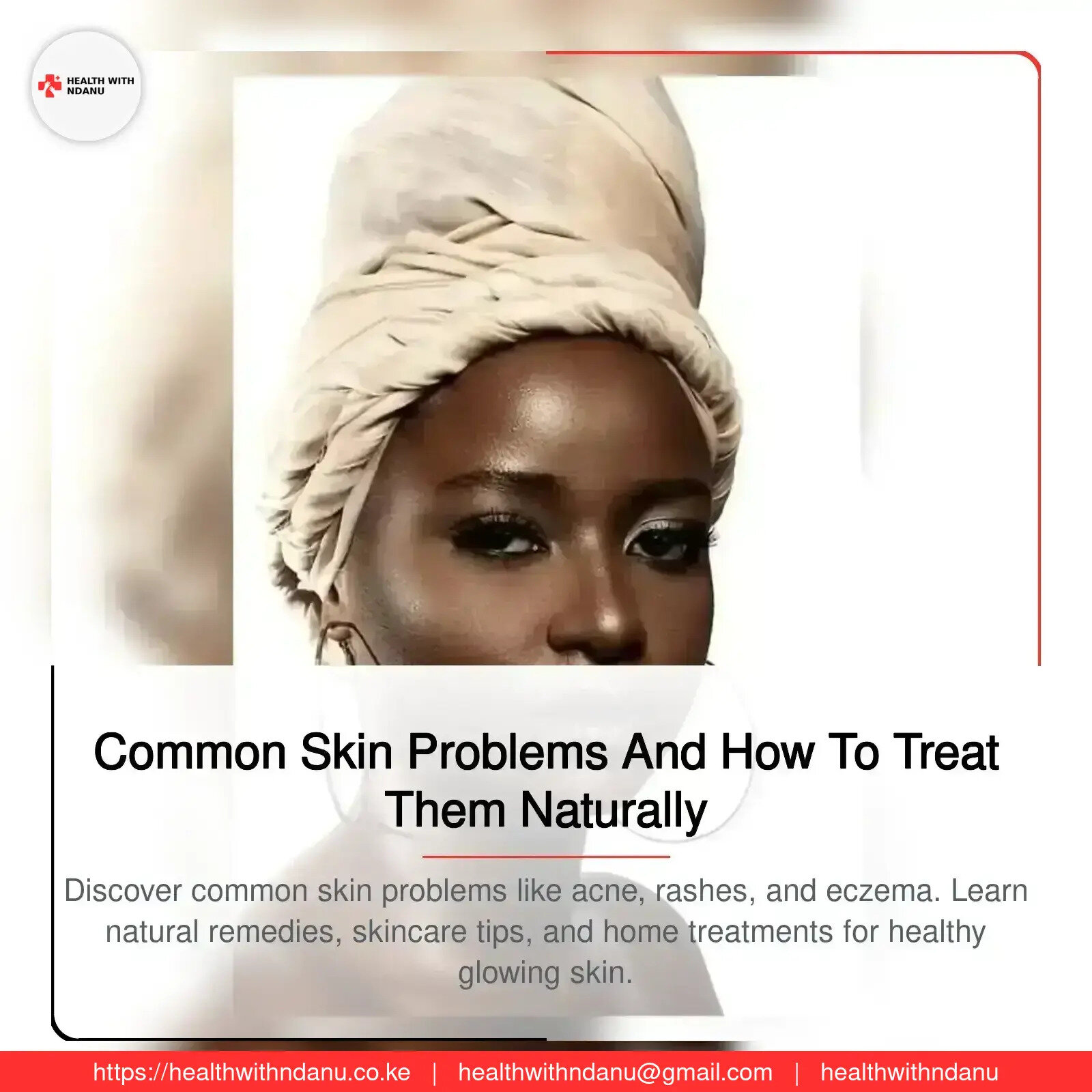Common Skin Problems And How To Treat Them Naturally
- by Diana Ndanu
- 23 February, 2025
- 88 Comments
- 6 Mins



Introduction
Your skin is the largest organ of your body, and it plays a vital role in protecting you from environmental toxins, bacteria, and harsh weather. However, many people struggle with skin problems that range from mild to severe. These conditions can be caused by genetics, lifestyle choices, diet, stress, or even improper skincare routines.
The good news? Most skin conditions can be managed or treated naturally with the right remedies, diet changes, and skincare routines. In this detailed guide, we’ll explore the most common skin problems, their causes, and natural solutions to help you achieve healthy, radiant skin.
1. Acne
What is Acne?
Acne is one of the most common skin conditions worldwide. It occurs when your skin’s pores become clogged with oil, dead skin cells, and bacteria, leading to breakouts in the form of pimples, blackheads, whiteheads, and even cysts.
Causes of Acne:
- Excess oil production (sebaceous glands overproducing sebum)
- Bacteria (Propionibacterium acnes)
- Hormonal fluctuations (especially during puberty, menstruation, or pregnancy)
- Diet (high sugar, dairy, and processed foods)
- Stress (triggers cortisol, which increases oil production)
Natural Remedies for Acne:
1. Tea Tree Oil – Has antibacterial properties that fight acne-causing bacteria. Apply diluted tea tree oil directly to pimples.
2. Aloe Vera – Reduces inflammation and redness. Apply fresh aloe vera gel to affected areas.
3. Honey and Cinnamon Mask – Honey is antibacterial, and cinnamon reduces inflammation. Mix and apply for 15 minutes before rinsing.
4. Green Tea Extract – Reduces sebum production and inflammation when applied topically.
5. Apple Cider Vinegar – Balances the skin’s pH and acts as a natural astringent. Always dilute before use.
2. Eczema (Atopic Dermatitis)
What is Eczema?
Eczema is a chronic condition that causes dry, itchy, red, and inflamed skin. It is often triggered by allergens, irritants, and environmental factors.
Causes of Eczema:
- Genetics (family history of eczema or allergies)
- Allergens (dust mites, pollen, pet dander)
- Harsh skincare products (soaps, detergents, and perfumes)
- Weather changes (dry or cold air)
- Stress (weakens the skin barrier)
Natural Remedies for Eczema:
1. Coconut Oil – Moisturizes and reduces inflammation. Apply virgin coconut oil to affected areas.
2. Oatmeal Baths – Soothes irritated skin. Add colloidal oatmeal to a lukewarm bath.
3. Aloe Vera Gel – Cools and hydrates the skin.
4. Shea Butter – Provides deep moisture and strengthens the skin barrier.
5. Chamomile Tea Compress – Reduces redness and irritation.
3. Psoriasis
What is Psoriasis?
Psoriasis is an autoimmune skin condition that causes rapid skin cell turnover, leading to red, scaly patches on the skin.
Causes of Psoriasis:
- Immune system dysfunction (overactive immune response)
- Stress (triggers flare-ups)
- Infections (strep throat, respiratory infections)
- Cold weather (dry conditions worsen psoriasis)
Natural Remedies for Psoriasis:
1. Turmeric – Has anti-inflammatory properties. Take turmeric supplements or apply turmeric paste to affected areas.
2. Apple Cider Vinegar – Can help with scalp psoriasis. Dilute and apply with a cotton pad.
3. Aloe Vera – Soothes itching and redness.
4. Omega-3 Fatty Acids – Found in fish oil, these help reduce inflammation.
5. Dead Sea Salt Baths – Helps exfoliate and relieve itching.
4. Hyperpigmentation (Dark Spots & Uneven Skin Tone)
What is Hyperpigmentation?
Hyperpigmentation occurs when certain areas of the skin become darker due to excess melanin production. It often results from sun exposure, acne scars, or hormonal changes.
Causes of Hyperpigmentation:
- Sun exposure (UV rays trigger melanin production)
- Post-inflammatory hyperpigmentation (PIH) (caused by acne scars or skin trauma)
- Hormonal changes (pregnancy, birth control)
- Aging
Natural Remedies for Hyperpigmentation:
1. Lemon Juice (Diluted) – Has natural brightening properties.
2. Aloe Vera – Contains aloin, which helps fade dark spots.
3. Vitamin C Serum – Reduces pigmentation and promotes collagen production.
4. Rose Water – Helps refresh and even out skin tone.
5. Sunscreen – Prevents further darkening of existing spots.
5. Dry Skin
What Causes Dry Skin?
- Cold weather (low humidity levels)
- Harsh soaps and cleansers (strip natural oils)
- Aging (reduced oil production)
- Dehydration (lack of water intake)
Natural Remedies for Dry Skin:
1. Honey – A natural humectant that locks in moisture.
2. Avocado Mask – Rich in healthy fats that nourish dry skin.
3. Oatmeal Baths – Soothes irritation and deeply hydrates.
4. Drink More Water – Hydration starts from within!
6. Oily Skin
What Causes Oily Skin?
- Overactive sebaceous glands
- Genetics
- Hormonal fluctuations
- Overwashing (causes the skin to produce more oil)
Natural Remedies for Oily Skin:
1. Witch Hazel – A natural astringent that controls oil.
2. Clay Masks (Bentonite or Kaolin) – Absorb excess sebum.
3. Aloe Vera Gel – Hydrates without clogging pores.
4. Green Tea Extract – Reduces oil production and inflammation.
7. Rosacea
What Causes Rosacea?
- Triggers like spicy food, alcohol, caffeine, and stress
- Sun exposure (UV rays cause flare-ups)
- Weakened skin barrier
Natural Remedies for Rosacea:
1. Chamomile Tea Compress – Reduces redness and irritation.
2. Aloe Vera Gel – Calms inflammation and hydrates.
3. Green Tea Extract – Helps with redness and sensitivity.
4. Sunscreen – Always protect your skin from UV damage.
My Personal Experience with Dry Skin and Lips
Having dry skin and lips has been a constant struggle for me, especially during colder months or when I’m in air-conditioned rooms for too long. No matter how much moisturizer I applied, my skin would still feel tight, flaky, and sometimes even irritated. My lips were no different—chapped, peeling, and often requiring multiple layers of lip balm throughout the day.
I tried several drugstore moisturizers, but many either felt too greasy or didn’t provide long-lasting hydration. After some trial and error, I realized that hydration starts from within, so I made small but impactful changes—drinking more water, incorporating healthy fats like avocado and nuts into my diet, and using gentle, fragrance-free skincare products.
For my lips, I discovered that natural oils like coconut and almond oil worked wonders overnight, and using a sugar and honey scrub once a week helped remove dead skin. Now, while I still experience occasional dryness, my skin feels softer, more nourished, and less irritated—all thanks to a simple yet effective routine tailored to my needs.
Would you like me to suggest a customized skincare routine based on your experience?
Final Thoughts: The Key to Healthy Skin
The key to managing skin conditions naturally is understanding your skin type, avoiding triggers, and using the right ingredients. Whether you’re battling acne, dry skin, or hyperpigmentation, making simple lifestyle changes and using natural remedies can restore your skin’s health and balance.
However, if a skin condition persists, worsens, or causes discomfort, consult a dermatologist for a professional diagnosis and treatment plan.
Got Your Own Experience? Share with us
Popular Categories
Mablogu Zinazobambwa Sana
Daily Newsletter
Get all the top stories from Blogs to keep track.



